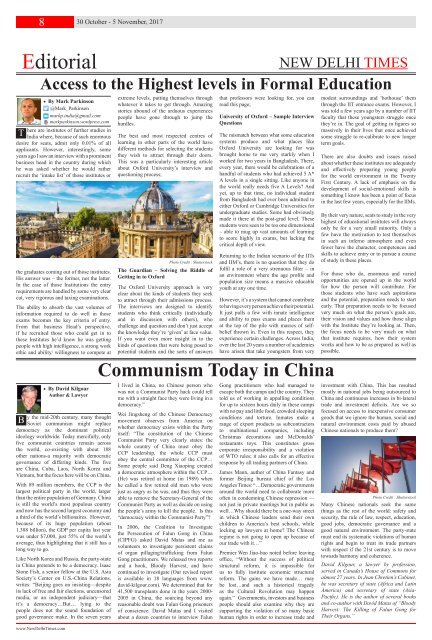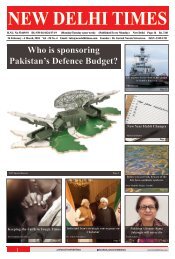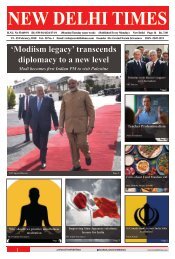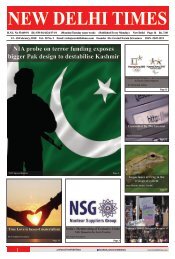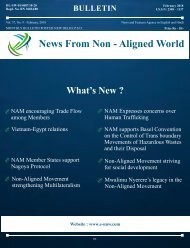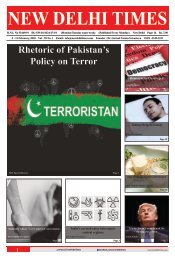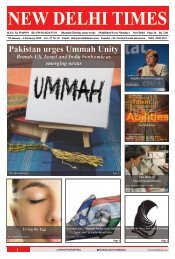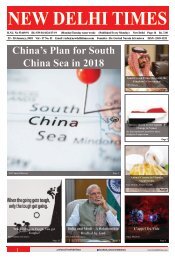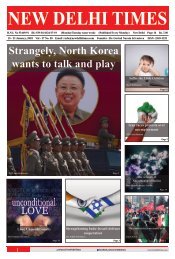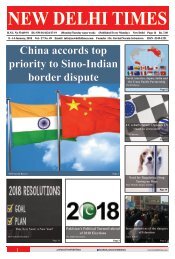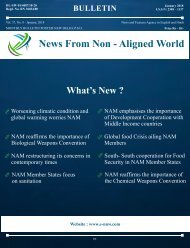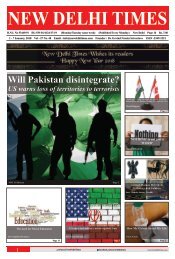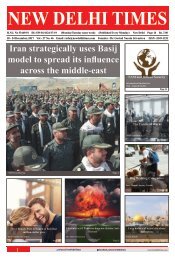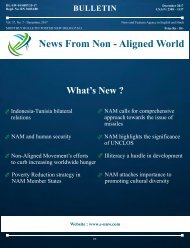30 October - 5 November 2017-min
You also want an ePaper? Increase the reach of your titles
YUMPU automatically turns print PDFs into web optimized ePapers that Google loves.
8<br />
<strong>30</strong> <strong>October</strong> - 5 <strong>November</strong>, <strong>2017</strong><br />
T<br />
B<br />
Editorial<br />
www.NewDelhiTimes.com<br />
◆◆<br />
By Mark Parkinson<br />
@Mark_Parkinson<br />
markp.india@gmail.com<br />
markparkinson.wordpress.com<br />
◆◆<br />
By David Kilgour<br />
Author & Lawyer<br />
NEW DELHI TIMES<br />
Access to the Highest levels in Formal Education<br />
here are institutes of further studies in<br />
India where, because of such enormous<br />
desire for seats, admit only 0.01% of all<br />
applicants. However, interestingly, some<br />
years ago I saw an interview with a pro<strong>min</strong>ent<br />
business head in the country during which<br />
he was asked whether he would rather<br />
recruit the ‘intake list’ of those institutes or<br />
the graduates co<strong>min</strong>g out of those institutes.<br />
His answer was – the former, not the latter.<br />
In the case of those Institutions the entry<br />
requirements are handled by some very clear<br />
cut, very rigorous and taxing exa<strong>min</strong>ations.<br />
The ability to absorb the vast volumes of<br />
information required to do well in those<br />
exams becomes the key criteria of entry.<br />
From that business Head’s perspective,<br />
if he recruited those who could get in to<br />
these Institutes he’d know he was getting<br />
people with high intelligence, a strong work<br />
ethic and ability/ willingness to compete at<br />
y the mid-20th century, many thought<br />
Soviet communism might replace<br />
democracy as the do<strong>min</strong>ant political<br />
ideology worldwide. Today mercifully, only<br />
five communist countries remain across<br />
the world, co-existing with about 188<br />
other nations-a majority with democratic<br />
governance of differing kinds. The five<br />
are China, Cuba, Laos, North Korea and<br />
Vietnam, but the focus here will be on China.<br />
With 89 million members, the CCP is the<br />
largest political party in the world, larger<br />
than the entire population of Germany. China<br />
is still the world’s most populous country<br />
and now has the second largest economy and<br />
a third of the world’s billionaires. However,<br />
because of its huge population (about<br />
1.388 billion), the GDP per capita last year<br />
was under $7,000, just 55% of the world’s<br />
average, thus highlighting that it still has a<br />
long way to go.<br />
Like North Korea and Russia, the party-state<br />
in China pretends to be a democracy. Isaac<br />
Stone Fish, a senior fellow at the U.S. Asia<br />
Society’s Center on U.S.-China Relations,<br />
writes: “Beijing goes on insisting—despite<br />
its lack of free and fair elections, uncensored<br />
media, or an independent judiciary—that<br />
it’s a democracy…But… lying to the<br />
people does not the sound foundation of<br />
good governance make. In the seven years<br />
extreme levels, putting themselves through<br />
whatever it takes to get through. Amazing<br />
stories abound of the arduous experiences<br />
people have gone through to jump the<br />
hurdles.<br />
The best and most respected centres of<br />
learning in other parts of the world have<br />
different methods for selecting the students<br />
they wish to attract through their doors.<br />
This was a particularly interesting article<br />
about Oxford University’s interview and<br />
questioning process;<br />
Photo Credit : Shutterstock<br />
The Guardian – Solving the Riddle of<br />
Getting in to Oxford<br />
The Oxford University approach is very<br />
clear about the kinds of students they seek<br />
to attract through their admissions process.<br />
The interviews are designed to identify<br />
students who think critically (individually<br />
and in discussion with others), who<br />
challenge and question and don’t just accept<br />
the knowledge they’re ‘given’ at face value.<br />
If you want even more insight in to the<br />
kinds of questions that were being posed to<br />
potential students and the sorts of answers<br />
that professors were looking for, you can<br />
read this page;<br />
University of Oxford – Sample Interview<br />
Questions<br />
The mismatch between what some education<br />
systems produce and what places like<br />
Oxford University are looking for was<br />
brought home to me very starkly when I<br />
worked for two years in Bangladesh. There,<br />
every year, there would be celebrations of a<br />
handful of students who had achieved 5 A*<br />
A levels in a single sitting. Like anyone in<br />
the world really needs five A Levels? And<br />
yet, up to that time, no individual student<br />
from Bangladesh had ever been admitted to<br />
either Oxford or Cambridge Universities for<br />
undergraduate studies. Some had obviously<br />
made it there at the post-grad level. These<br />
students were seen to be too one dimensional<br />
– able to mug up vast amounts of learning<br />
to score highly in exams, but lacking the<br />
critical depth of view.<br />
Returning to the Indian scenario of the IITs<br />
and IIM’s, there is no question that they do<br />
fulfil a role of a very strenuous filter – in<br />
an environment where the age profile and<br />
population size means a massive educable<br />
youth at any one time.<br />
However, it’s a system that cannot contribute<br />
to having every person achieve their potential.<br />
It just pulls a few with innate intelligence<br />
and ability to pass exams and places them<br />
at the top of the pile with masses of selfbelief<br />
thrown in. Even in this respect, they<br />
experience certain challenges. Across India,<br />
over the last 20 years a number of academies<br />
have arisen that take youngsters from very<br />
Communism Today in China<br />
I lived in China, no Chinese person who<br />
was not a Communist Party hack could tell<br />
me with a straight face they were living in a<br />
democracy.”<br />
Wei Jingsheng of the Chinese Democracy<br />
movement observes from America on<br />
whether democracy exists within the Party<br />
itself: “The constitution of the Chinese<br />
Communist Party very clearly states: the<br />
whole country of China must obey the<br />
CCP leadership, the whole CCP must<br />
obey the central committee of the CCP…<br />
Some people said Deng Xiaoping created<br />
a democratic atmosphere within the CCP…<br />
(He) was retired at home (in 1989) when<br />
he called a few retired old men who were<br />
just as angry as he was, and thus they were<br />
able to remove the Secretary-General of the<br />
Communist Party as well as decide on using<br />
the people’s army to kill the people. Is this<br />
“democracy within the Communist Party”?<br />
In 2006, the Coalition to Investigate<br />
the Persecution of Falun Gong in China<br />
(CIPFG) asked David Matas and me as<br />
volunteers to investigate persistent claims<br />
of organ pillaging/trafficking from Falun<br />
Gong practitioners. We released two reports<br />
and a book, Bloody Harvest, and have<br />
continued to investigate (Our revised report<br />
is available in 18 languages from www.<br />
david-kilgour.com). We deter<strong>min</strong>ed that for<br />
41,500 transplants done in the years 2000-<br />
2005 in China, the sourcing beyond any<br />
reasonable doubt was Falun Gong prisoners<br />
of conscience. David Matas and I visited<br />
about a dozen countries to interview Falun<br />
Gong practitioners who had managed to<br />
escape both the camps and the country. They<br />
told us of working in appalling conditions<br />
for up to sixteen hours daily in these camps<br />
with no pay and little food, crowded sleeping<br />
conditions and torture. Inmates make a<br />
range of export products as subcontractors<br />
to multinational companies, including<br />
Christmas decorations and McDonalds’<br />
restaurants toys. This constitutes gross<br />
corporate irresponsibility and a violation<br />
of WTO rules; it also calls for an effective<br />
response by all trading partners of China.<br />
James Mann, author of China Fantasy and<br />
former Beijing bureau chief of the Los<br />
Angeles Times: “…Democratic governments<br />
around the world need to collaborate more<br />
often in condemning Chinese repression —<br />
not just in private meetings but in public as<br />
well…Why should there be a one-way street<br />
in which Chinese leaders send their own<br />
children to America’s best schools, while<br />
locking up lawyers at home? The Chinese<br />
regime is not going to open up because of<br />
our trade with it…”<br />
Premier Wen Jiao-bao noted before leaving<br />
office, “Without the success of political<br />
structural reform, it is impossible for<br />
us to fully institute economic structural<br />
reform. The gains we have made… may<br />
be lost…and such a historical tragedy<br />
as the Cultural Revolution may happen<br />
again.” Governments, investors and business<br />
people should also exa<strong>min</strong>e why they are<br />
supporting the violation of so many basic<br />
human rights in order to increase trade and<br />
modest surroundings and ‘hothouse’ them<br />
through the IIT entrance exams. However, I<br />
was told a few years ago by a number of IIT<br />
faculty that these youngsters struggle once<br />
they’re in. The goal of getting in figures so<br />
massively in their lives that once achieved<br />
some struggle to re-calibrate to new longer<br />
term goals.<br />
There are also doubts and issues raised<br />
about whether these institutes are adequately<br />
and effectively preparing young people<br />
for the world environment in the Twenty<br />
First Century. A lack of emphasis on the<br />
development of social-emotional skills is<br />
something I know has been a point of focus<br />
in the last few years, especially for the IIMs.<br />
By their very nature, seats to study in the very<br />
highest of educational institutes will always<br />
only be for a very small <strong>min</strong>ority. Only a<br />
few have the motivation to test themselves<br />
in such an inferno atmosphere and even<br />
fewer have the character, competences and<br />
skills to achieve entry or to pursue a course<br />
of study in these places.<br />
For those who do, enormous and varied<br />
opportunities are opened up in the world<br />
for how the person will contribute. For<br />
those students who have such aspirations<br />
and the potential, preparation needs to start<br />
early. That preparation needs to be focused<br />
very much on what the person’s goals are,<br />
their vision and values and how those align<br />
with the Institute they’re looking at. Then,<br />
the focus needs to be very much on what<br />
that institute requires, how their system<br />
works and how to be as prepared as well as<br />
possible.<br />
investment with China. This has resulted<br />
mostly in national jobs being outsourced to<br />
China and continuous increases in bi-lateral<br />
trade and investment deficits. Are we so<br />
focused on access to inexpensive consumer<br />
goods that we ignore the human, social and<br />
natural environment costs paid by abused<br />
Chinese nationals to produce them?<br />
Photo Credit : Shutterstock<br />
Many Chinese nationals seek the same<br />
things as the rest of the world: safety and<br />
security, the rule of law, respect, education,<br />
good jobs, democratic governance and a<br />
good natural environment. The party-state<br />
must end its systematic violations of human<br />
rights and begin to treat its trade partners<br />
with respect if the 21st century is to move<br />
towards harmony and coherence.<br />
David Kilgour, a lawyer by profession,<br />
served in Canada’s House of Commons for<br />
almost 27 years. In Jean Chretien’s Cabinet,<br />
he was secretary of state (Africa and Latin<br />
America) and secretary of state (Asia-<br />
Pacific). He is the author of several books<br />
and co-author with David Matas of “Bloody<br />
Harvest: The Killing of Falun Gong for<br />
Their Organs.”


